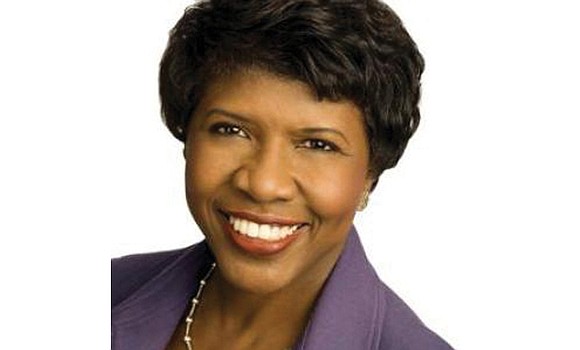Gwen Ifill, Washington journalist, was also a historymaker
11/19/2016, 10:59 a.m.
By Wayne Dawkins
Gwen Ifill, a preacher’s kid who grew up in New York public housing to embark on a nearly four-decade journalism career and became the gold standard of Washington political reporting, died Monday, Nov. 14, 2016, after a yearlong battle with cancer. She was 61.
Ms. Ifill moderated the February presidential debate between Democratic primary rivals Hillary Clinton and Bernie Sanders. In May, the longtime PBS news anchor took a leave of absence as co-anchor of “The PBS NewsHour” and moderator of “Washington Week” to address health issues.
One of Ms. Ifill’s final PBS stories was a report on the opening of the Smithsonian’s National Museum of African American History and Culture.
After graduation from Simmons College in Boston in 1977, Ms. Ifill began her career as a reporter at the Boston Herald-American newspaper. She covered local politics there before moving to the Baltimore Evening Sun and later advancing to the big time — covering the White House for The Washington Post and subsequently The New York Times.
Yet, those lofty media perches were not enough. In 1994, Tim Russert of NBC’s “Meet the Press” persuaded Ms. Ifill to leave the print world and become a political correspondent at NBC News. She thrived in television and made her next move to PBS and the “NewsHour.”
She made history in 1999 when she was named the moderator of “Washington Week in Review,” the Friday roundtable show that assembled the best Washington journalists as analysts. Ms. Ifill ran that table.
In 2013, Ms. Ifill, with Judy Woodruff, again made history as an all-women anchor team of the “NewsHour.”
Through a stellar career, Ms. Ifill beat back prejudice and ignorance from co-workers and others. As an intern in Boston, a co-worker left her a note with a racial epithet telling her to “go home.” Another time, a fellow journalist asked her if she was “in the tank” for Barack Obama during his run for president, she recalled in an interview with The Washington Post. “I’m still capable of looking at his pros and cons in a political sense,” she said at the time. “No one’s ever assumed a white reporter can’t cover a white candidate.”
Ms. Ifill said that while covering the U.S. Department of Housing and Urban Development, she was probably the only Washington journalist on the cabinet-level beat who actually lived at one time in federally subsidized housing.
In appreciations posted since her death, Ms. Ifill’s media colleagues and friends repeated this phrase: She projected warmth and authority. Even when asking tough policy questions, she delivered those questions with a smile that solicited explanation instead of confrontation.
“I always appreciated Gwen’s reporting,” President Obama said at a Monday afternoon news conference, “even when I was on the receiving end of one of her tough and thorough interviews.”
Plaudits also came from the Congressional Black Caucus through its chairman, U.S. Rep. G.K. Butterfield of North Carolina.
“Ms. Ifill was among the nation’s finest political correspondents as she was gracious and poised when addressing some of the most pressing issues facing the country,” he said. “Her voice will be missed among journalism and broadcasts, but her legacy will continue to have a lasting impact on how we view news and journalism today.
At the same time Ms. Ifill projected authority, she was always well informed and curious.
Among her numerous pioneering achievements was moderating vice presidential debates in 2004 and 2008. She had a knack for asking the necessary questions elite journalists ask of leading politicians, yet she always kept an “us” question in her purse for black America.
During the 2004 debate between GOP vice presidential candidate Dick Cheney and Democratic opponent John Edwards, she asked the candidates to explain what the government response should be to AIDS, which was afflicting African-American women disproportionately. Both stunned candidates babbled their answers.
The 2008 vice presidential debate between Democrat Joe Biden and Republican Sarah Palin was a pop culture treat. Ms. Palin pivoted so frequently and bizarrely from Ms. Ifill’s policy questions that in a “Saturday Night Live” skit, Queen Latifah parodied Ms. Ifill as the nonplussed moderator, a portrayal that Ms. Ifill later said was funny.
Ms. Ifill gave bullies and fools no quarter. In 2007, shock jock Don Imus called Rutgers University women’s basketball team members “nappy-headed ho’s.” During the ensuing public uproar, Mr. Imus also falsely denied that he had said of Ms. Ifill years earlier, “Isn’t The Times wonderful? It lets the cleaning lady cover the White House.”
In response, Ms. Ifill, who was then established at PBS, wrote an op-ed rebutting Mr. Imus that was published in The New York Times. He soon was jettisoned from his radio platform.
Ms. Ifill was honored with numerous awards for her work and accomplishments by organizations, including the National Association of Black Journalists, Harvard University’s Joan Shorenstein Center, the Peabody Awards and the Radio and Television News Directors Association.
She also was a best-selling author. Her first book, “The Breakthrough: Politics and Race in the Age of Obama,” was released the day of President Obama’s first inauguration in 2009.
Indeed, Ms. Ifill was an authority, but she will be remembered most for her warmth and grace.
The writer is a professor of professional practice at Hampton University’s Scripps Howard School of Journalism and Communications.








